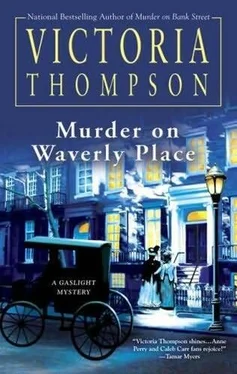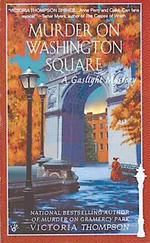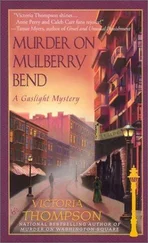Sarah smiled in spite of herself. “Maybe you should go see Madame.”
“I can’t imagine what else I’d ask him, though,” she mused. “I’d think one visit would be enough.”
Sarah tried to recall what the others had been asking. “They seemed to want guidance about making decisions. As if they came back regularly to ask about something new.”
“Oh, dear, how tiresome,” Mrs. Ellsworth said. “Why can’t they just make up their own minds? Or at least ask somebody who’s easier to contact, like a living relative, for instance?”
This really made Sarah smile. “I’m sure I don’t know. But some people just don’t seem to be able to stop. I don’t want my mother to become one of them.”
“Oh, I’m sure your father would soon put a stop to it if she did,” Mrs. Ellsworth said.
Sarah wasn’t so sure. Felix Decker was one of the richest, most powerful men in the city, but he was completely powerless to manage his wife, particularly if he had no idea what she was doing. “Let’s hope it doesn’t come to that,” Sarah said and tried to change the subject. “Is that the newspaper?”
Mrs. Ellsworth glanced over to where the paper lay folded on the end of the table. “Oh, yes, I brought it over for you to see. I don’t suppose you’ve heard the news yet,” she added with a frown.
“What news?”
“About Mr. Roosevelt.”
“Oh, dear,” Sarah said, reaching for the paper. She unfolded it to reveal the headline, ROOSEVELT RESIGNS. She quickly scanned the story. Her old friend Theodore Roosevelt had resigned as police commissioner to accept a job in Washington, D.C. “Just as my father predicted.”
“Your father knew that President McKinley was going to offer him a position in Washington?” Mrs. Ellsworth asked in amazement.
“I’m sure he didn’t know exactly what it would be, but politicians always pay their debts, and Mr. Roosevelt campaigned very vigorously for McKinley. The president will be giving out hundreds of political patronage jobs to his supporters to reward them.”
“Assistant secretary of the Navy doesn’t sound like a very important job,” Mrs. Ellsworth observed.
“I’m sure Theodore will make the most of it,” Sarah said, recalling her old friend’s ambition fondly, “although this probably isn’t good news for the police department.”
“What do you mean?”
“Mr. Roosevelt made a lot of changes in the department. He hired men on merit instead of political patronage. He promoted men who were good at their jobs instead of those who could afford to pay a bribe to get a better position. He even hired officers who weren’t Irish.”
“But surely they won’t go back to the way things were before just because Mr. Roosevelt leaves,” Mrs. Ellsworth protested.
“Mr. Malloy is afraid they will,” Sarah said, recalling what he had told her. “That’s why he was in such a hurry to solve Tom’s murder. He knew Roosevelt was going to resign soon, and then he might not be allowed to work on the case anymore.”
“Oh, my,” Mrs. Ellsworth said with a frown. “Is he afraid he might lose his job?”
Sarah knew that was a possibility. Roosevelt had singled Malloy out several times to work on cases involving wealthy murder victims. Some in the department would be envious of that special treatment, and they could hold it against him. But Sarah thought that wouldn’t be the worst thing that could happen. “He might be, but I think he’s more afraid of having to go back to the way things were before all the reforms.”
Mrs. Ellsworth nodded. “He’s changed a lot since he met you.”
Yes, he had, Sarah thought, and she had changed, too. She’d never thought she’d be able to love again after losing Tom, and she’d certainly never thought she could love a policeman.
MAEVE HAD OBVIOUSLY WANTED TO HEAR ALL ABOUT THE séance the moment Sarah had walked in the door, but she knew better than to discuss it in front of Catherine. She had to wait until Catherine was tucked snuggly into bed and she could slip downstairs to find Sarah in the kitchen, still cleaning up after supper.
“I’ll do that,” Maeve said, taking the dishtowel from Sarah’s hand. “Sit yourself down and tell me everything that happened!”
Sarah did. Maeve listened attentively, asking only the occasional clarifying question. When Sarah was finished, Maeve sat down across from her at the kitchen table and considered what she had heard for several moments.
“Well?” Sarah prodded after a while.
“Well, what?” Maeve asked in surprise.
“What do you think? Was any of it real?”
Maeve shrugged. “It’s easy enough to change your voice and pretend you’re somebody else.”
“But she sounded like a man ,” Sarah protested.
“Like I said, actors change their voices all the time.”
“What about the baby crying?”
“I don’t know. I’d have to see the room. There’s ways to do that, though. Have you ever seen a magician?”
“Yes, I have.”
“Do you think he really makes things appear out of thin air?”
“Of course not. It’s a trick.”
“Madame Serafina probably knows some tricks, too.”
Sarah frowned. “I’m sure she does. The truly amazing thing wasn’t that we heard a baby cry but that she knew about the baby in the first place, or rather that Yellow Feather or whoever it was knew about it.”
“Did you talk about Maggie and her baby while you were waiting with the other people?”
“No, I’m sure we didn’t. Why would that matter?”
“She might be able to overhear what people are talking about while they’re waiting. That would be a good way to get private information about them.”
“She wouldn’t have heard us talking about Maggie. In fact, my mother even asked Madame Serafina if she needed to know who we wanted to contact. Madame said no, so she knew nothing about us before we arrived.”
“I doubt that,” Maeve scoffed. “People know a lot about Mrs. Felix Decker.”
Sarah hadn’t thought of that. “I suppose that’s true.”
“And didn’t you say your mother’s friend was the one who told her about this and invited her to come? She probably told Madame everything she knew.”
“But she didn’t know about Maggie’s baby. Nobody knows that except our family.”
“ I know,” Maeve reminded her.
Sarah laid a hand on Maeve’s arm where it rested on the table. “You’re family,” she said, remembering how Maeve had recently risked her life to help solve the mystery of Tom Brandt’s murder.
Maeve blinked at her in surprise. “Oh,” was all she could manage for several seconds.
Sarah hurried on before Maeve’s emotions got the better of her. “So you see, Madame couldn’t have known about Maggie’s baby.”
“Maybe it was a lucky guess. Lots of babies die. I’m sure somebody else in the room could’ve thought it was a baby in their family, too, if your mother hadn’t spoken up first.”
Sarah hadn’t thought of that. “You’re probably right.”
“I wish I knew more about this séance business. I could explain to Mrs. Decker how they do it, and she’d be cured of ever wanting to go back.”
“I’m hoping she’s already cured.”
“Well, if she’s not, ask her to take me along next time. At least I could pretend I believe in it.”
“I could’ve pretended I believed in it if I’d wanted to,” Sarah protested, pretending to be insulted.
But Maeve was shaking her head. “You’re an awful liar, Mrs. Brandt.”
“Some people would consider that a compliment,” Sarah reminded her.
“Yes,” Maeve agreed with a grin. “Some people would.”
MRS. DECKER ARRIVED THE NEXT DAY WITH A NEW PICTURE book for Catherine. She didn’t mention Maggie or the séance, and Sarah believed she had put it all behind her. The next two weeks passed uneventfully. Sarah delivered a few babies, and her mother chanced to visit when she was out, so they hadn’t seen each other again. Then one day, her doorbell rang.
Читать дальше












